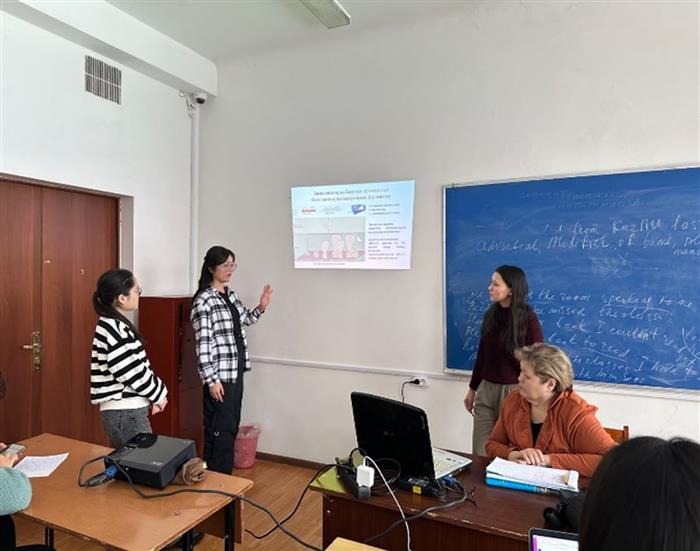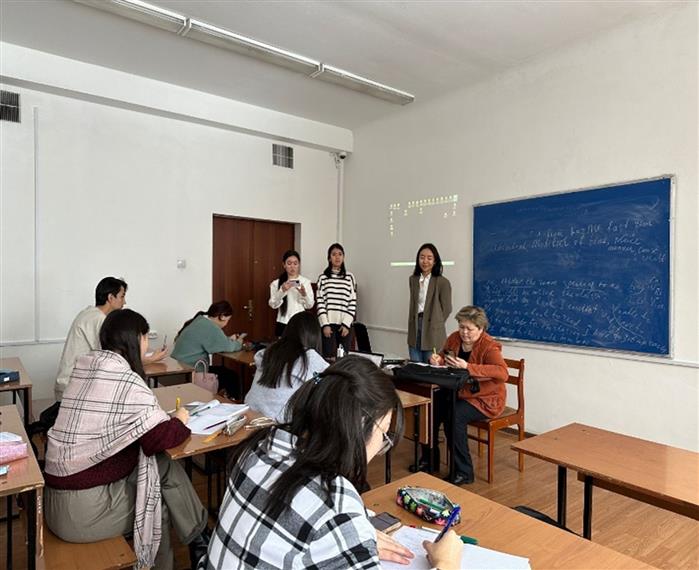Event on the topic: “Use of enzymes in medicine and clinical biochemistry” within the framework of SDG 3. “Ensuring healthy lives and promoting well-being for all at all ages.”
On December 11, 2023 at 12:00 p.m. in the 309 auditorium of GUK-6, Professor Shoinbekova S.A. conducted a lecture–event on the topic with 4th–year students of the specialty "06B05103 - Biotechnology" in the trajectory of studying the discipline «Enzymology»: «THE USE OF ENZYMES IN MEDICINE AND CLINICAL BIOCHEMISTRY» AS PART OF the implementation OF SDG 3. «ENSURING A HEALTHY LIFESTYLE AND PROMOTING WELL-BEING FOR ALL AT ANY AGE».


The opening speech was made by Doctor of Economics, Professor Shoinbekova S.A. She told the background of the appearance of this Program and explained the essence of the Program «Sustainable Development Goals».
Program that was originally called the Millennium Development Goals (MDGs), which was supposed to be launched in 2015. The main goal of this Program was to free humanity from poverty and "heal" the planet in the period up to 2030. In 2012, at the UN Conference on Sustainable Development, the UN member states decided to establish a working group to develop a set of sustainable development goals, which a year later presented recommendations for defining 17 Sustainable Development Goals.
The Sustainable Development Goals (SDGs) are 17 interrelated goals as a «blueprint for achieving a better and more sustainable future for all». The concept of sustainable development combines three main directions: economic, social and environmental, and these are: optimal use of limited resources and environmentally friendly — natural, energy, and material-saving technologies, maintaining the stability of social and cultural systems, ensuring the integrity of biological and physical natural systems.
On September 25, 2015, 193 countries adopted the following 17 global goals:
- The universal eradication of poverty in all its forms.
- Eliminating hunger, ensuring food security and improving nutrition and promoting sustainable agricultural development.
- Ensuring a healthy lifestyle and promoting well-being for everyone at any age.
- Ensuring inclusive and equitable quality education and promoting lifelong learning opportunities for all.
- Ensuring gender equality and the empowerment of all women and girls.
- Ensuring the availability and rational use of water resources and sanitation for all.
- Ensuring access to affordable, reliable, sustainable and modern energy sources for all.
- Promoting sustained, inclusive and sustainable economic growth, full and productive employment and decent work for all.
- Promoting sustained, inclusive and sustainable economic growth, full and productive employment and decent work for all.
10. Building strong infrastructure, promoting inclusive and sustainable industrialization and innovation.
11. Reducing inequality within and between countries.
12. Ensuring the openness, security, resilience and sustainability of cities and human settlements.
13. Ensuring rational consumption and production patterns.
14. Taking urgent measures to combat climate change and its consequences.
15. Conservation and rational use of oceans, seas and marine resources for sustainable development.
16. Protection, restoration of terrestrial ecosystems and promotion of their rational use, rational forest management, combating desertification, halting and reversing land degradation and halting the loss of biological diversity.
- Promoting the building of peaceful and open societies in the Internet.
The implementation of the SDG Program will play a fairly large role in solving global problems. It is officially stated that over the past almost two decades, it has been possible to almost halve the percentage of people living below the poverty line, reduce child and maternal mortality by almost half, make significant progress in combating diseases such as HIV and malaria, and more than double the amount of assistance provided by developed countries in order to development.
Then the reports of the students were heard:
- «The use of enzyme preparations in the food industry».
- «Enzyme diagnostics and enzyme therapy»
- «The use of enzymes in genetic engineering».
Students discussed and debated with great interest the problems of public health, nutrition, hunger, the expansion of the halo of modern bad habits, the importance of proper nutrition on human health, discussed the search for solutions to these problems, the creation of balanced foods, the use of GMOs, discussed ways to eliminate hunger, attracting people of all ages to a healthy lifestyle, sports, the contribution of biotechnology and enzymology to solving public health problems.
It was noted that this goal of sustainable development requires quite large expenditures (financing for the creation of food products and providing every person on the planet with adequate nutrition, for protecting human health (solving problems of diagnosis and treatment of various epidemics, providing the population with modern high-quality and effective vaccines and medicines, medical institutions, etc.). But this program will It is successful and will be solved if each person starts with a small one – himself: he will lead a healthy lifestyle, monitor the health of his own and those close to him, strive to raise the social standard of living.

In addition, the students noted that it is necessary to treat water, the environment, food products carefully and rationally, and properly dispose of food waste. The students reacted very responsibly to the holding of this event: reports and presentations were competently prepared, they actively worked with literature, made posters, which is a good indicator of their professional level, showed personal qualities and patriotism.








